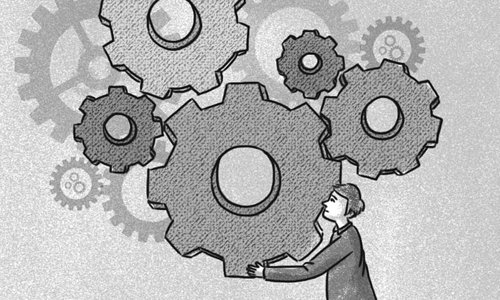India should improve business environment to vitalize its economy
India should improve business environment to boost economic momentum

Illustration: Xia Qing/GT
India's sick economy has drawn lots of attention from both domestic and global markets. Its economic growth declined to just 5 percent during the second quarter of this year, marking its slowest pace in six years. In the first half of 2019, the Indian economy grew 5.4 percent, meaning that it is no longer the world's fastest growing economy.
From the perspective of the global economic environment, the world economic slowdown and the US-China trade war just added insult to injury for the Indian economy. As for the long-term economic cycle, since 2014 the world economy and trade has entered a low-growth period that may last for about 10 years, meaning that the good times for the sustained and rapid growth of the global economy and trade have ended.
In India, a series of institutional and structural problems have constrained the country from releasing its economic growth potential.
The serious imbalance of income distribution has curbed the continued expansion of domestic consumption, the biggest drive for India's economic growth.
The combination of "private land ownership plus agricultural land leasing" has increased the difficulty of land acquisition, to the detriment of India's industrial optimization and upgrading.
A lagging education system has made many young Indians unqualified workers for modern industries. To a large extent, its demographic dividend exists only on paper.
It is undeniable that India's economic growth is undergoing a continuous decline, but we must admit that the economy decelerated following years of rapid growth. While India's current growth rate has fallen below that of China, it is still higher than that of most other countries in the world, and the Indian economy still has the potential to achieve continuous growth.
Moreover, although some of the reform measures implemented by the government of Prime Minister Narendra Modi during his first five-year tenure have brought certain shocks in the short-term, they will have long-term positive effects on the country's economic and social development.
Then, in the face of the slowing economic growth, what should India do to boost its economic momentum? For starters, it needs to set up rational economic goals and unswervingly push forward in that direction.
The Indian government has formulated plans to become a $5-trillion economy. While I appreciate India's development ambition, I also feel that some of the proposed goals are contradictory and thus cannot be achieved at the same time. For instance, India expects its domestic consumption to reach $4 trillion. Considering the country's reality and tradition, it is justified to fuel its economic growth with domestic consumption, but it also means that an increase in its economic growth will inevitably cause larger deficits in its goods trade. Thus, Indian policymakers need to make a wise choice as to whether it should give priority to achieving faster economic growth or to cutting the trade deficit, and then pursue its goals unflinchingly.
In this context, improving its business environment should be a top priority and a breakthrough point for India, which needs to attach great importance to improving this environment for foreign-owned companies. The business circle has long been complaining about the deficiency of India's business climate, which impeded numerous projects that may benefit the long-term development of India's economy and society.
When it comes to attracting foreign direct investment, especially from foreign manufacturers, India has relied too much on compulsory measures like unilaterally increasing tariffs on finished products to force manufacturers to set up factories locally, rather than improving its business environment. The approach cannot help significantly improve the country's efficiency, but instead may have negative effects like propping up domestic costs and inflationary pressure, which also provides negative incentives for Indian governments at all levels to improve public services.
Fundamentally speaking, reciprocity is key to the sustainable development of international economic and trade cooperation. It is through the continuous efforts to improve our business environment that China can quickly grow into one of the world's top destinations for foreign direct investment. China is willing to actively participate in India's economic development and to share its own experience and lessons with Indian partners. Therefore, to boost its economic momentum, India should start with a friendly attitude towards Chinese investors, which can best demonstrate India's determination and practical action in improving its own business environment.
The author is a research fellow with the Chinese Academy of International Trade and Economic Cooperation under the Ministry of Commerce. bizopinion@globaltimes.com.cn
Newspaper headline: India should improve business environment to boost economic momentum